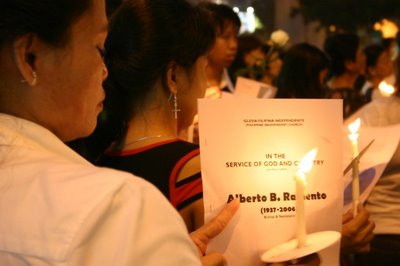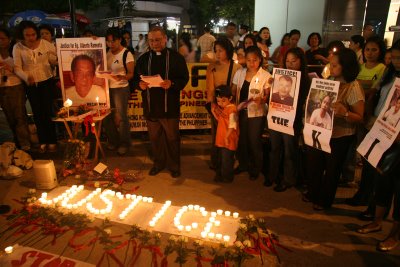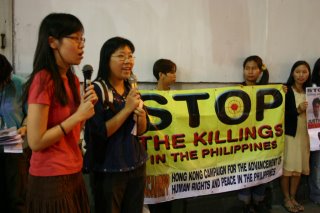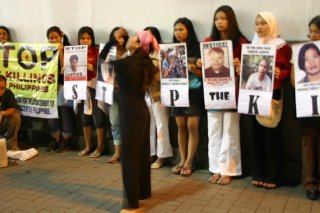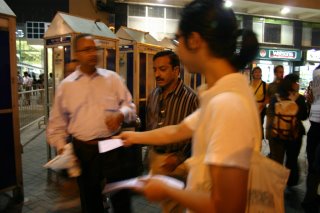Yesterday, June 24, we held the Asian Day against Torture as part of the commemoration of the June 26 United Nations International Day in Support of the Victims of Torture. This was held in the central lawn of the Victoria Park, Causeway Bay a popular place among Indonesian migrant workers during their rest day.

The Asian Human Rights Commission, Asian Migrants Coordinating Body, Asia Pacific Mission for Migrants and the Asian Students Association worked together and coordinated closely in ensuring the success of the first ever Asian Day.
The whole program was filled with informative and moving speeches as well as cultural presentations that kept the attention as well as moved some of the audience to tears.
Basil Fernando of the AHRC opened the program with a strong speech followed by equally powerful speeches from the various leaders of the AMCB. Booths set up near the main stage also provided the people with information about the situation of torture in the various countries, especially where the migrants came from. They are, namely, Indonesia, Sri Lanka, Thailand, Nepal and the Philippines.
Here is the statement of the Asian Human Rights Commission on that day:
A Statement by the Asian Human Rights Commission on the Occasion ofthe UN International Day in Support of the Victims of Torture, June26, 2007
PHILIPPINES: Lack of law against torture and court delays deny redress for torture victims
Torture victims in the Philippines have suffered from the physical and mental pain inflicted on them by those who have mercilessly tortured them and have suffered a second time from the lack of a law criminalising torture. For years, torture victims in the country have been waiting for redress and a legal tool they can use to prosecute their torturers. Even filing complaints supported with substantial proof and medical evidence to support torture claims are later found to be a meaningless exercise by victims and their legal counsel. Because torture is not a criminal offence under the Philippines’ penal code, torture victims can file a complaint, but usually it makes little or no progress in the court system, if it even reaches the courts. It can even take prosecutors years—for instance, 11 years in one case—without resolving a complaint. Often those accused are able to retire or commit similar offences again and again without being held accountable for their violent actions.

It is a fact of life that the use of torture by the police and military as methods of criminal investigation and punishment is endemic in the country. What is shocking is the negligible effort to eradicate torture or the lack of legal remedies available to victims and their legal counsel to challenge these illegal practices employed by the security forces. While the authorities deny the prevalence of torture in the country, the reality is otherwise: torture is endemic and is commonly practiced in the Philippines. Often the burden to prove the use of torture rests with the victims themselves, not with those who violently abused them. Some public prosecutors have even argued that it is normal for suspects to claim they were tortured, thus, in effect, implying that anyone who makes such an accusation is not trustworthy.

What is more worrisome is that some prosecutors fail to comprehend the significance of having a law against torture. They do not find it necessary to enact such a law, arguing that the 1987 Constitution’s Bill of Rights already prohibits torture. This assertion is made even though they know that in order to give meaning to this constitutional provision it requires an enabling law thatdefines torture as a criminal act and provides adequate remedies. They likewise maintain that such a law would “overcriminalise” the offence instead of protecting the victim’s rights. There is consequently a negligible understanding by some public prosecutors of the absolute right against torture. This mentality is endemic, however, not only among prosecutors but also the public. Their understanding of torture is so flawed that it has subconsciously become an acceptable practice, a normal part of criminal investigations. Brutality and cruelty in police stations and military camps against any person suspected of committing a crime in their view deserve to be tortured. As a result of this attitude, the basic foundation of criminal justice—the presumption of innocence—is diluted and becomes irrelevant.

In recent times, allegations of torture against policemen have surfaced. For instance, in January, a man claimed to have been brutally tortured while in police custody at the Philippine National Police (PNP) headquarters in Quezon City. The victim claimed he was electrocuted and deprived of sleep. Although his release was later ordered by the court, despite the gravity of his allegations, no known credible investigation or sanctions against those involved took place afterwards. Internal Affairs Services (IAS), a quasijudicial body of the PNP, is mandated to conduct automatic investigations of alleged human rights violations committed by the police, but there has been no known action taken in this case. Not only have the allegations of torture not been investigated, but the policemen have not been held accountable.
Justice for torture victims is absent even in cases in which the Commission on Human Rights (CHR) has concluded in their investigation that the police tortured a suspect, such as the case of the “Abadilla Five”—five men who were tortured to confess to killing a senior police officer and sentenced to death. Inthe case of the “Abadilla Five,” the victims’ complaints have been pending for 11 years but have not yet even reached the court. Although the commission determined that the victims were tortured and recommended that charges be filed against the policemen who arrested and tortured them, no action has been taken. One of the police officers in the torture complaint, Senior Superintendent Bartolome Baluyot, was later accused of torturing other suspects in General Santos City—three years after his alleged involvement in the “Abadilla Five” case—and was able to retire from the police force. Six of the policemen in the torture complaint died before being prosecuted.
In this case, the Office of the Ombudsman for the Military and Other Law Enforcement Offices (Moleo), where the case is presently pending, has yet to resolve whether or not the policemen involved should be held for trial even though this complaint has been pending for 11 years, first with the Department of Justice (DoJ) and now with the Moleo. There is a likelihood that the case could suffer even further delays, for the ombudsman in charge of this case was replaced two months ago. Not only have the victims been denied redress due to the absence of laws and the non-prosecution of their perpetrators, theyhave also been denied speedy disposition of their case.
Thus, there is an unwillingness on the part of torture victims to pursue a case in court, not only because of the lack of a law against torture, but also due to excessive delays—the length of time and resources they have to expend to get redress and prosecute the perpetrators that, in the end, results in a meaningless and exhausting exercise for them. This reality reflects the nearimpossibility of obtaining remedies for torture victims. Moreover, the victims are forced to accept these harsh realities, and the government has continually failed to ensure that torture victims attain justice; the government, indeed, has ultimately neglected them.

The absence of a law against torture and remedies for torture victims, in essence, reflects tolerance for torture by all three branches of government. There is little apparent concern for the lack of accountability of the security forces that are accused of torture. Suspects consequently can be tortured with impunity. It also sends a strong message to victims that redress and prosecution of those responsible for torturing them is difficult—almost unachievable. When victims have the experience that their complaints are not taken seriously or they witness no progress in the court system, they come to believe that it is futile for them to complain. No complaint means no prosecution of their case and virtual acceptance and acquiescence for these illegal acts. This tragedy isentirely due to the lack of remedies and the inability of the government to protect and upheld its citizens’ constitutional rights.
The continued failure by the government to enact enabling laws against torture casts serious doubts on its ability to uphold the highest standards of human rights as a newly re-elected member of the U.N. Human Rights Council. It is inexcusable for a state party that signed and ratified the Convention against Torture and Other Cruel, Inhuman or Degrading Treatment or Punishment (CAT) to fail to ensure that domestic laws exist to give meaning to the provisions of CAT. The international community, including the people of the Philippines, must resist the continuing state-sanctioned violence against suspects in police stations and military camps and the absence of remedies for torture victims. To do otherwise is to tolerate the torture of Filipinos.

















